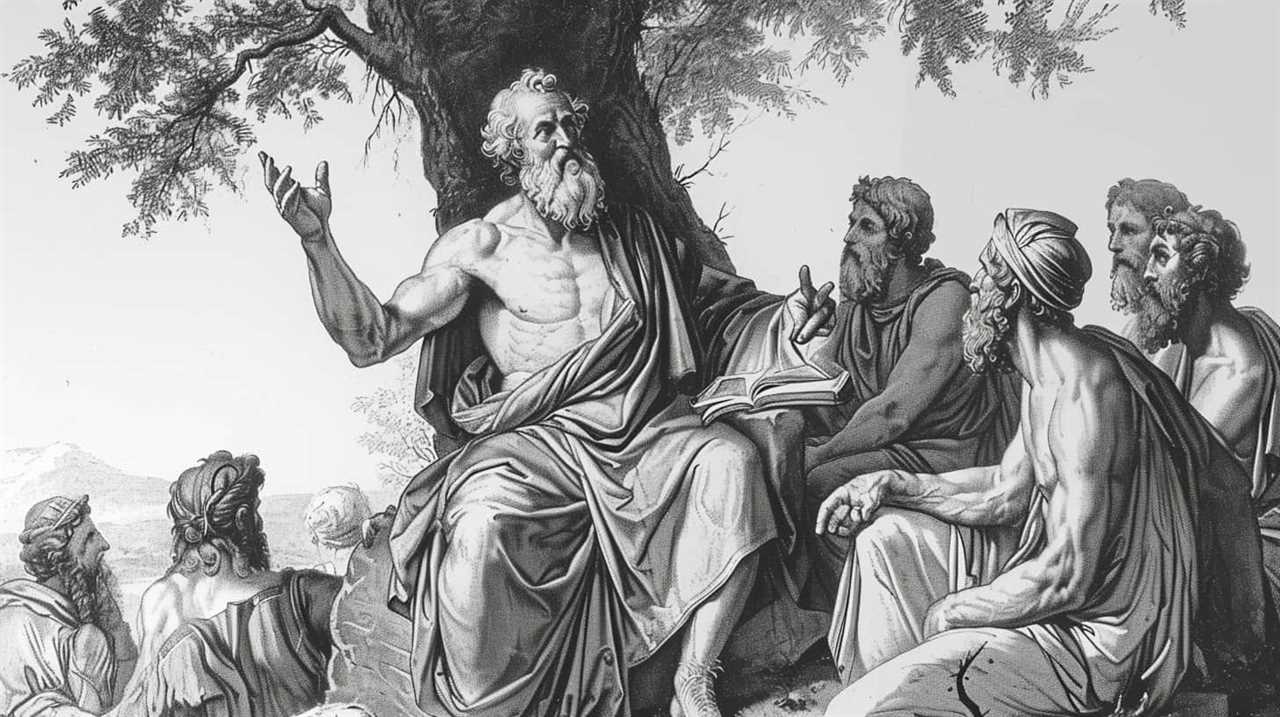Picture a world in which technology molds our reality, where its influence on our lives goes beyond the practical and delves into the philosophical. Step into the realm of modern perspectives on technology’s philosophical implications.
In this exciting exploration, we delve into the profound ethical questions surrounding technological advancement and ponder the nature of progress itself. We contemplate the inseparable relationship between technology and the human condition, as well as its role in shaping society.
Furthermore, we question how technology influences our personal identities and contemplate its implications for the future of humanity. Together, we embark on a journey to reimagine the philosophy of technology, and perhaps uncover new insights that will guide us towards a future filled with innovative possibilities.
Key Takeaways
- Technology’s impact on society and relationships is significant, redefining reality, transforming how we perceive information, and influencing social interactions and relationships.
- Ethical implications arise from rapid technological development, including issues of privacy, security, and equity, as well as the responsibility and accountability in the development of artificial intelligence systems.
- Technological progress disrupts established norms and systems, raising ethical and existential questions and challenging notions of privacy, autonomy, and human identity.
- Humanity’s reliance on technology is increasing rapidly, shaping experiences and understanding of self and the world, blurring the boundaries between physical and digital realms, and prompting questions about values, authenticity, and identity in a digital world.

Technology as a Shaper of Reality
We believe that technology plays a significant role in shaping our reality. With its transformative influence, technology has the power to redefine reality as we know it. It has become an integral part of our daily lives, influencing how we communicate, work, and even perceive the world around us.
One of the ways in which technology redefines reality is through its ability to create virtual environments. Virtual reality (VR) technology allows us to immerse ourselves in artificial worlds, blurring the line between what’s real and what’s not. Through VR, we can experience places and situations that would otherwise be impossible or impractical to encounter in our physical reality.
Furthermore, technology has revolutionized the way we perceive and interact with information. The internet has provided us with instant access to an overwhelming amount of knowledge, changing the way we learn and acquire information. Moreover, social media platforms have transformed how we connect and communicate with others, shaping our social interactions and relationships.

The Ethics of Technological Advancement
As technology continues to advance, our society is faced with complex ethical dilemmas surrounding its rapid development and implementation. The rapid growth and constant evolution of technology have led to a plethora of moral questions and concerns. From artificial intelligence to genetic engineering, we find ourselves at the forefront of a technological revolution that demands careful consideration of the ethical implications.
One of the key ethical dilemmas that arises is the question of moral responsibility. Who bears the responsibility when a technology is developed that has unintended consequences? Should it be the creator, the user, or the society as a whole? Furthermore, as technology becomes more intertwined with our daily lives, we must also grapple with issues such as privacy, security, and equity.
As we navigate these ethical dilemmas, it’s crucial that we approach technological advancement with a sense of moral responsibility. We must consider not only the potential benefits that technology can bring, but also the potential harms and unintended consequences. It’s our duty to ensure that technological progress is guided by ethical principles, taking into account the well-being of individuals and society as a whole.
In the subsequent section, we’ll delve deeper into the nature of technological progress, exploring the impact it has on our understanding of reality and the ways in which it shapes our lives.

The Nature of Technological Progress
In examining the philosophical impact of technology, it’s crucial to delve into the nature of technological progress and its transformative effects on our understanding of reality and daily lives. Technological evolution is a complex and multifaceted phenomenon that shapes the world we live in today.
Here are three key aspects of the nature of progress:
- Acceleration: Technological progress is characterized by a continuous and exponential growth in innovation and development. The rate at which new technologies emerge and impact our lives is unprecedented. As a result, our understanding of reality is constantly expanding, challenging our existing beliefs and pushing the boundaries of what’s possible.
- Disruption: Technological progress often disrupts established norms and systems. It has the power to revolutionize industries, transform economies, and redefine social structures. This disruption can be both exciting and unsettling, as it forces us to adapt to new ways of living and interacting with the world.
- Duality: While technological progress brings about numerous benefits and advancements, it also raises ethical and existential questions. It challenges our notions of privacy, autonomy, and human identity. As we embrace new technologies, we must grapple with the potential consequences and ensure that progress aligns with our values and aspirations.

Technology and the Human Condition
As we navigate the ever-evolving landscape of technology, it becomes evident that humanity’s reliance on it’s growing at an unprecedented rate. This reliance raises important ethical implications that we must confront. From privacy concerns to the impact on the environment, we must critically examine the consequences of our technological advancements.
Additionally, as technology continues to shape our social interactions, we must question the effects it has on our relationships and our ability to connect authentically with others. Ultimately, technology’s impact on the human condition forces us to confront our values and reconsider what it means to be human in an increasingly digital world.
Humanity’s Reliance on Technology
Relying heavily on technology, we navigate the complexities of the human condition. Our interaction with machines has become an integral part of our daily lives, shaping our experiences and influencing our understanding of ourselves and the world around us.
The rise of human-machine interaction has brought both opportunities and challenges, blurring the boundaries between what’s considered human and what’s considered technological. As we become more dependent on technology, we also face the risk of technological addiction, where our reliance on devices and virtual experiences hinders our ability to fully engage with the physical world and connect with one another on a deeper level.
This reliance on technology raises important questions about the impact it has on our well-being, our relationships, and our sense of self.
Transitioning into the next section, we must now explore the ethical implications of this ever-growing technological presence in our lives.
Ethical Implications of Technology
Navigating the complexities of the human condition, our interaction with technology raises ethical concerns about its impact on the human experience. As technology becomes increasingly integrated into our daily lives, we are faced with pressing issues surrounding privacy and AI ethics.
| Privacy Concerns | AI Ethics |
|---|---|
| The collection and use of personal data by technology companies raise concerns about privacy invasion and the potential misuse of information. | The development of artificial intelligence brings about questions of responsibility and accountability. How can we ensure that AI systems are designed and programmed to act ethically and in alignment with human values? |
| The growing prevalence of surveillance technologies raises concerns about the erosion of individual privacy and the potential for abuse of power. | As AI systems become more autonomous and capable of making decisions, we must address concerns about bias, discrimination, and the impact on human autonomy. |
| The use of facial recognition technology raises ethical questions about consent, surveillance, and the potential for misuse. | We must also consider the potential ethical implications of AI systems replacing human labor and the impact on employment and socioeconomic inequality. |
As we continue to embrace and rely on technology, it is crucial that we actively engage in discussions and debates surrounding these ethical implications. By doing so, we can strive for technological advancements that align with our values and enhance the human experience.
Technology and Social Relationships
Our ongoing integration of technology into our daily lives inevitably affects the dynamics of our social relationships. As technology becomes increasingly intertwined with our social interactions, it’s crucial to examine the impact it has on our emotional well-being and ability to connect with others.
- Technology and Loneliness: While technology provides us with countless avenues for communication, it can also contribute to feelings of isolation and loneliness. The reliance on virtual interactions may hinder the development of meaningful connections and genuine human contact.
- Technology and Empathy: With the rise of digital communication, there’s a risk of losing the ability to empathize and understand others’ emotions. The absence of non-verbal cues and physical presence in online interactions can hinder our capacity to fully comprehend and respond to the emotions of others.
- The Role of Technology in Society: The impact of technology on social relationships extends beyond individual experiences. It shapes the fabric of society, influencing social norms, values, and the way we interact with one another.
As we delve into the role of technology in society, it’s imperative to consider both the positive and negative consequences of its impact on social relationships.

The Role of Technology in Society
As society becomes increasingly dependent on technology, it’s important to consider the ethical implications that arise.
Technology has the power to shape our values, beliefs, and behaviors, raising questions about privacy, surveillance, and the digital divide.
Furthermore, technology’s impact on relationships can’t be ignored, as it both connects and disconnects us from one another.
In exploring the role of technology in society, we must critically examine its effects on our values, ethics, and interpersonal connections.
Society’s Dependence on Technology
Relying on technology has become an integral part of our daily lives, shaping the way we communicate, work, and interact with the world around us. As technology continues to advance at an unprecedented rate, it’s important for us to examine the societal consequences and addiction concerns that arise from our dependence on it.
- Diminished face-to-face communication: With the rise of smartphones and social media, our interactions have become increasingly mediated by screens. This can lead to a decrease in genuine human connection and a loss of important social skills.
- Work-life imbalance: Technology has made it easier for us to stay connected to work at all times, blurring the boundaries between our personal and professional lives. This can result in increased stress and a lack of work-life balance.
- Vulnerability to cyber threats: As our reliance on technology grows, so does the risk of cyber attacks and data breaches. This raises concerns about the privacy and security of our personal information.
As we navigate the ever-evolving technological landscape, it’s crucial to find a balance between embracing innovation and being mindful of the potential negative impacts it can have on our society.
Ethical Implications of Technology
One significant aspect of technology’s impact on society is the ethical implications it raises. As technological advancements continue to shape our lives, we must critically examine the ethical dilemmas they present.
From artificial intelligence to genetic engineering, these advancements have the potential to greatly benefit humanity, but they also bring forth complex ethical questions. How should we navigate issues of privacy and data security in the digital age? What’re the ethical implications of automation and job displacement? How do we ensure that technological advancements are used for the collective good and not for the exploitation of individuals or the environment?
These are just a few of the ethical considerations that arise as technology continues to advance. It’s crucial that we engage in thoughtful and responsible dialogue to ensure that technology serves society in an ethical and equitable manner.
Technology’s Impact on Relationships
Technology’s integration into our daily lives has profoundly transformed the dynamics of relationships, shaping the way we connect, communicate, and interact with one another. As we navigate this digital age, it’s essential to consider the impact of technology on our emotional connections and communication.
- Enhanced emotional connection: Technology allows us to bridge the physical distance and maintain emotional bonds with loved ones through video calls, messaging apps, and social media platforms. We can share moments, express emotions, and provide support in real-time, regardless of geographical boundaries.
- Altered communication patterns: Technology has revolutionized the way we communicate, providing us with a plethora of options such as texting, emailing, and social media messaging. However, this convenience comes with challenges. Misinterpretations, lack of non-verbal cues, and the constant stream of notifications can hinder effective communication and lead to misunderstandings.
- Potential for disconnection: Paradoxically, while technology offers opportunities for connection, it can also contribute to feelings of isolation and disconnection. Excessive reliance on digital communication can replace meaningful face-to-face interactions, leading to a decline in social skills and a sense of detachment.

The Limits of Technological Knowledge
Our understanding of technology’s capabilities is inherently bounded by the limits of our knowledge and the complex interplay between its various components. While technology continues to advance at an unprecedented pace, there are ethical implications and epistemological constraints that shape our understanding of its potential.
| Ethical Implications | Epistemological Constraints |
|---|---|
| Privacy concerns in the age of surveillance technologies | The development of technology is influenced by societal values and biases |
| The impact of automation on employment and income inequality | The limitations of human cognition in fully comprehending complex technological systems |
| Cybersecurity threats and the need for robust safeguards | The reliance on limited data and incomplete models in predicting technological outcomes |
| The ethical implications of artificial intelligence and its potential to replace human decision-making | The challenge of distinguishing between correlation and causation in technological phenomena |
As we push the boundaries of what technology can achieve, we must also consider the ethical implications that arise. Issues such as privacy, automation, cybersecurity, and the use of artificial intelligence require careful thought and consideration. Additionally, we must acknowledge the epistemological constraints that shape our understanding of technology. Our knowledge is influenced by societal values and biases, and our cognitive limitations make it difficult to fully comprehend the intricate workings of complex technological systems. Furthermore, the limitations of available data and the complexity of technological phenomena can hinder our ability to accurately predict outcomes.
In order to navigate the limits of technological knowledge, we must foster interdisciplinary collaborations and engage in critical discourse. By bringing together diverse perspectives and expertise, we can better understand the ethical implications of technology and develop strategies to mitigate potential risks. Moreover, we must invest in research and education to expand our knowledge base and develop the analytical tools needed to address the challenges posed by emerging technologies. Only through a holistic and multidimensional approach can we push the boundaries of technological innovation while ensuring its responsible and ethical use.

The Impact of Technology on Personal Identity
As technology continues to advance, it increasingly shapes our digital selfhood and influences our personal identity.
The virtual realms created by technology provide us with new spaces to explore and define ourselves, blurring the boundaries between the physical and digital worlds.
Moreover, our relationship with technological artifacts, such as smartphones and social media platforms, plays a significant role in shaping our identity and how we perceive ourselves.
The impact of technology on personal identity is a complex and evolving topic that raises questions about authenticity, self-expression, and the boundaries of our individuality in the digital age.
Shaping Digital Selfhood
The rapid advancements in technology have significantly shaped our digital selfhood, profoundly influencing our personal identities. As we navigate the digital realm, our digital representation becomes an integral part of who we are. Our online identity isn’t just a reflection of ourselves, but also a curated version that we present to the world.
Here are three key ways in which technology shapes our digital selfhood:
- Expanded Possibilities: Technology allows us to create and explore new aspects of our identity in the digital space. We can experiment with different personas, express ourselves through various platforms, and connect with like-minded individuals on a global scale.
- Permanence and Control: Our digital selfhood offers a sense of permanence and control over our identity. We can carefully craft our online presence, selectively sharing aspects of ourselves and managing our reputation.
- Identity Fragmentation: While technology offers endless possibilities, it can also lead to identity fragmentation. With multiple online platforms and personas, it can be challenging to maintain a cohesive sense of self. We must navigate the tension between our online and offline identities, ensuring they align and represent our authentic selves.
Identity in Virtual Realms
One important aspect to consider when examining the impact of technology on personal identity is the role of virtual realms. With the rise of virtual reality and online communities, individuals now have the opportunity to create virtual embodiments of themselves and navigate through digital spaces as online personas. This phenomenon raises questions about the nature of identity and the concept of online personhood. Are our virtual identities extensions of our physical selves, or do they possess a separate existence? The table below explores these questions by contrasting the characteristics of physical and virtual identity:
| Physical Identity | Virtual Identity |
|---|---|
| Rooted in the body | Disembodied |
| Limited by physical constraints | Boundless and malleable |
| Subject to geographical limitations | Accessible from anywhere |
As technology continues to evolve, the concept of identity in virtual realms will become increasingly relevant. It challenges us to rethink traditional notions of self and raises profound philosophical questions about the nature of existence in a digital age.
Technological Artifacts and Identity
In our exploration of the impact of technology on personal identity, we now turn our attention to the role of technological artifacts in shaping our sense of self. As individuals, we’re constantly seeking ways to express our unique identities, and technology has become a powerful tool in this pursuit.
Here are three ways in which technology influences our individuality and self-expression:
- Customization: Technological artifacts, such as smartphones and wearable devices, allow us to personalize our possessions and showcase our personal style. From choosing customized phone cases to creating unique watch faces, technology provides us with endless opportunities for self-expression.
- Virtual avatars: In virtual realms, we have the ability to create digital representations of ourselves, known as avatars. These avatars can be customized to reflect our desired appearance, personality, and even abilities. Technology enables us to explore different aspects of our identity and experiment with self-expression in virtual spaces.
- Online platforms: The rise of social media and digital platforms has revolutionized the way we present ourselves to the world. We can curate our online personas, carefully selecting the aspects of our identity that we wish to share with others. Technology has given us the power to shape our digital identities and express ourselves on a global scale.

Technology and the Future of Humanity
Our collective destiny is intricately intertwined with the advancements and implications of technology for the future of humanity. As technology continues to evolve at an unprecedented rate, it has the potential to shape the very essence of what it means to be human. The relationship between technology and human evolution is a complex one, with both positive and negative implications.
On one hand, advancements in technology have allowed us to overcome physical limitations, enhance our cognitive abilities, and extend our lifespan. The integration of technology into our lives has become so seamless that it is difficult to imagine a world without it. However, this reliance on technology has also raised concerns about the potential loss of our humanity and the erosion of our natural abilities.
The concept of technological singularity further exacerbates these concerns. Technological singularity refers to the hypothetical moment when artificial intelligence surpasses human intelligence, leading to an exponential growth in technology and potentially changing the course of human history. This raises questions about the implications of such a scenario for our society, ethics, and even our very existence.
To better understand the impact of technology on the future of humanity, let us examine the potential benefits and drawbacks in a table:
| Potential Benefits | Potential Drawbacks |
|---|---|
| Enhanced capabilities and quality of life | Dependence on technology and loss of natural abilities |
| Increased efficiency and productivity | Potential job displacement and economic inequality |
| Advancements in healthcare and longevity | Ethical dilemmas surrounding privacy, autonomy, and artificial intelligence |
| Greater access to information and global connectivity | Threats to security, privacy, and personal relationships |
As we navigate the uncharted waters of technological advancement, it is crucial to critically examine the implications of these advancements on our future. While technology has the potential to revolutionize our lives, we must approach it with caution and ethical considerations. By harnessing the power of innovation and embracing responsible technological development, we can shape a future that benefits all of humanity.

The Relationship Between Science and Technology
Throughout history, science and technology have been inextricably linked, evolving together to drive progress and shape our understanding of the world. The relationship between science and technology goes beyond mere collaboration; it’s a symbiotic partnership that fuels innovation and pushes the boundaries of human knowledge.
Here are three key aspects that highlight the intricate connection between science and technology:
- Science and innovation: Science provides the foundation for technological advancements by uncovering the fundamental principles of the natural world. Through the scientific method, researchers formulate hypotheses, conduct experiments, and gather empirical evidence to expand our knowledge base. This knowledge then serves as a springboard for technological innovation, as scientists and engineers employ scientific principles to develop new technologies and solve complex problems.
- Technological determinism: The concept of technological determinism suggests that technology shapes society and culture, impacting the way we live, work, and interact with one another. Science plays a pivotal role in this process, as it provides the knowledge and understanding necessary for the creation and implementation of transformative technologies. This interplay between science and technology reinforces the notion that they aren’t separate entities, but rather intertwined forces that shape our world.
- Philosophy of science: The relationship between science and technology also extends to the realm of philosophy. The philosophy of science explores the nature of scientific inquiry, the reliability of scientific knowledge, and the ethical implications of scientific advancements. As technology continues to evolve at an unprecedented rate, it raises philosophical questions about the impact of these advancements on society, the environment, and our understanding of the world.
Understanding the profound relationship between science and technology is crucial for reimagining the philosophy of technology. By acknowledging their interconnectedness, we can foster a more holistic approach that considers the ethical, social, and philosophical implications of technological progress.

Reimagining the Philosophy of Technology
With a renewed focus on the ethical implications of technological advancements, we can redefine our understanding of the philosophy of technology. As we delve deeper into the intricacies of our digital world, it becomes increasingly important to question the impact of technology on our existence and the philosophical implications that arise from it.
One of the key areas where redefining the philosophy of technology is crucial is in the realm of redefining existence. Technology has the power to reshape our understanding of what it means to be human. From artificial intelligence to virtual reality, these advancements challenge traditional notions of identity, consciousness, and even mortality. By examining the philosophical implications of technology, we can begin to explore new ways of defining our existence in this rapidly evolving digital age.
Furthermore, the philosophical implications of technology extend beyond the individual to society as a whole. As technology continues to shape the way we live, work, and interact, it raises important questions about power, control, and the distribution of resources. By critically examining the philosophical underpinnings of technology, we can ensure that these advancements are designed with the well-being of all in mind.

Frequently Asked Questions
How Does Technology Impact Our Daily Lives and Routines?
Technology impacts our daily lives and routines by enhancing productivity and creating a sense of dependency and addiction. It shapes the way we work, communicate, and access information, ultimately transforming our society and pushing us towards constant innovation.
What Are the Potential Risks and Dangers Associated With Technological Advancements?
What risks and dangers come with technological advancements? Are our privacy concerns being adequately addressed? Will job displacement become a reality? These are pressing questions that need careful consideration in our rapidly advancing world.
How Does Technology Influence Our Relationships and Social Interactions?
Technology greatly impacts our relationships and social interactions by altering the way we communicate and connect with others. It influences our empathy by creating distance and reliance on virtual interactions. It also facilitates the formation of online communities, reshaping our sense of belonging and identity.
Can Technology Ever Fully Replace Human Intelligence and Creativity?
Technology has made remarkable advancements, but it cannot fully replace human intelligence and creativity. While artificial intelligence has its strengths, it still has limitations. Additionally, technology plays a significant role in education, enhancing learning experiences and expanding knowledge.
What Are the Ethical Implications of Using Technology to Enhance Human Abilities?
Ethical considerations arise when using technology to enhance human abilities. We must evaluate the impact on individual autonomy, social equality, and the potential for misuse. Balancing these concerns with the realization of human potential is crucial for responsible innovation.

Conclusion
In conclusion, as we navigate the ever-evolving landscape of technology, it’s crucial to recognize its profound impact on our lives and society.
According to a recent study, 90% of individuals feel that technology has significantly changed the way they interact with the world. This staggering statistic serves as a reminder of the immense power technology holds in shaping our reality.
It’s imperative that we continue to engage in thoughtful discussions and ethical considerations to ensure that technology remains a force for positive progress.
Lauren’s talent in writing is matched by her passion for storytelling. Her love for books and deep understanding of culture and entertainment add a distinct flavor to her work. As our media and press contact, Lauren skillfully bridges the gap between afterQuotes and the broader media landscape, bringing our message to a wider audience.










